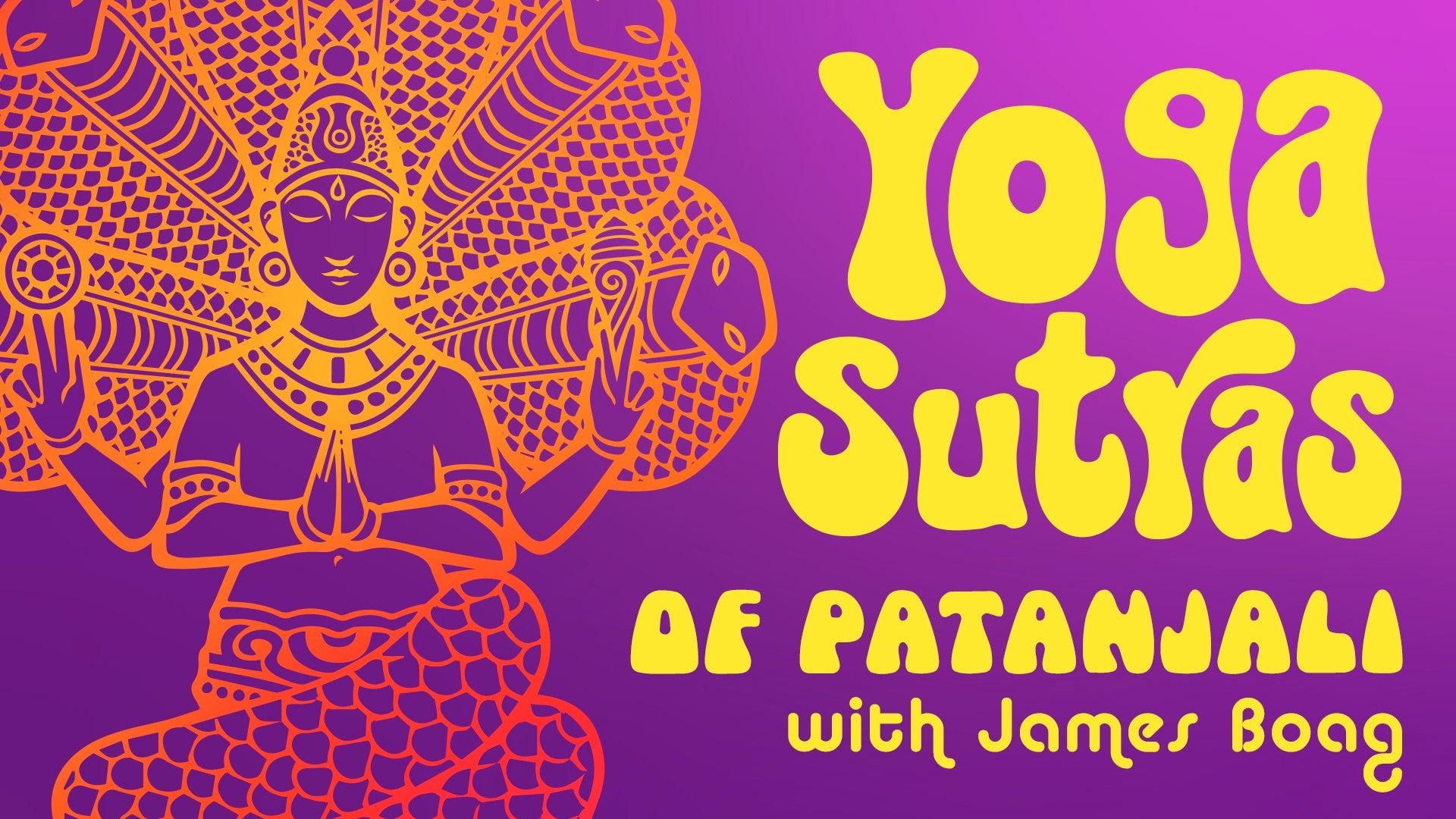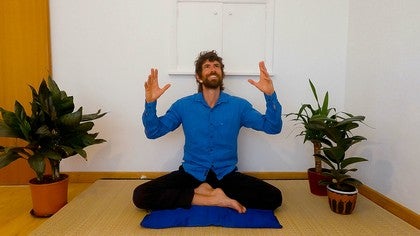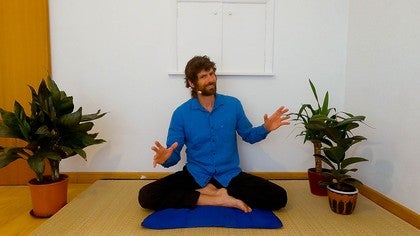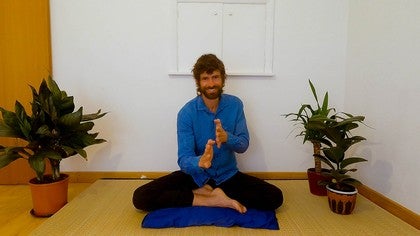Description
About This Video
Transcript
Read Full Transcript
Sutra 37, astaire, Pratish Thaiam, Sarivaratnua Pastanum, So here potentially says when there is that British diet, it won't become peacefully, calmly, well established, in that state of a steer, meaning non stealing, which we could term in a more positive way as respectfulness, So as we become established in the principle of respectfulness, non stealing, non criminality, when we're fully left behind all criminal tendencies, all self sabotaging tendencies. Then, means gem or precious due jewel. So the idea is when we become established in non theft, In respectfulness, all the precious things, all the precious gems and jewels will come to us. They will flood towards us. What does this mean?
So the one way I understand it is that when we stop stealing from ourselves and from others and from nature and existence, then we will actually create space to receive the blessings of that which is actually most precious and most valuable. So have you ever stolen from yourself or stolen from somebody else? It might not be that, you know, we steal their car, or we steal their money, but sometimes maybe I might steal from somebody because the way I interact with them isn't actually being fully respectful of their time or their energy or their point of view. In regard to myself, for example, sometimes I stole from myself yesterday, Yesterday, I made myself some food and towards the end of the meal, I had the thought, let me really savor the flavors. But for the first half of the meal, I was just eating mindlessly.
Relatively speaking. So I could say I said I was actually stealing from myself. I had this opportunity had this lovely, fresh, made food. And with every bite, with every morsel, there was the opportunity to really my body more deeply because they say in Iraveda, in the Indian system of a long, healthy balanced life, that a significant amount actually the majority of our nutrition actually comes in the mouth. The way when we when we savor the food, It actually triggers all of those miraculous systems and intelligence in the body that actually then help the body deploy all of the nutrition wherever it's needed.
Similarly, when I'm eating and I'm really being present to what I'm eating, I can train myself in the ways of Satya, in the ways of deep presence. And as I'm more present, I'm more to be able to eat in a way that is a hinsa that is gonna be fostering real nourishment and real harmony in the system. I don't know about you, but I have, on occasion, in my life, eaten a little bit more than I needed to, and that was not Ahinza. That was actually causing me a bit of harm. I wasn't so present, and I was stealing from myself.
I was stealing my own well-being because of my lack of presence and my lack of the cultivation of harmony. So we start to see here, if we haven't noticed already, how all of these Yamaniemi principles, they're very mutually supportive. I can't really practice our Hinsa without practicing these others. And whenever we work with any one of them, they will help us deepen the others. But Astea, respectfulness, non stealing, So when I'm eating, every time I eat, this is an opportunity to practice respectfulness, and we can apply this Yama, this principle, to pretty much everything that we do. When I do my work with yoga technique, if I like doing arsenal or Pranayama or whatever it might be.
Does this jewel edge sword with yoga techniques? There is great utility and value in repetition. When we repeat something and we we really make it our own, it becomes a more reliable gauge or barometer to help us tune to the send and help us notice how is this technique helping me tune into the center. And when a technique becomes familiar, it then allows us to take it deeper as we move from gross to subtle. So, for example, if I work with a particular arsenal sequence, but, see, I'd like doing a type of Srina Mascara type sun salutation. When the practice is brand new to me, just moving through space in a relatively coordinated way, that might recruit a lot of the powers of my awareness. It might bring me very forcefully, very powerfully into the present moment.
But once I know that sequence, by heart. When I can do it on autopilot, it could look from the outside like I'm moving very grace fully and easily and smoothly and Boag clean through the sequence, but inside, I could be doing all sorts of, you know, could be doing the shopping list or I could be ruminating on some problem and not really be present. So once the physical movements become very familiar, what yoga would ask us to do is to then add another layer onto that, or to take that into a subtler realm. So I'm moving, but I'm gonna be more conscious of the way the end is moving in my Boag. I subtle way, how I can, for example, connect to the grounding, earthing, or rooting energy of the earth and feel the flow of the element of water and feel the kindling wall of the element of fire and feel the communication element of air between all the different parts of my body as I move smoothly through the sequence.
And invite myself into a space of greater openness and freedom, for example. But I could also add another layer, so maybe I start pay more attention to the breath. And I invite the breath to become subtler. Maybe I also add a layer of emotional intent or I add a mantra. I add something that I'm working with a subtle level inside. And so as the practice becomes more familiar, I can take it more and more subtle.
Or I can lapse into autopilot and thievery criminality, stealing this amazing opportunity to actually invite myself more fully into the present the only time I ever really have to experience anything. And in the older edition, there are many teachers who've said over the centuries. When you're a human being, this is such an amazing opportunity. The gods in the heavens envy you human being, because you have Mishra Karama, you would experience beautiful things. You would experience difficult things.
And because of that, you will have your curiosity peaked. You will have that thought. It might strike you just once or twice in your childhood, but it's part of your reality as a human being. There must be something more than all this coming and going. And when we have that thought, it prompts that deeper inquiry into what is actually real here and now. So Azdeya is linked back to the principle of presence. Can I bring myself more respectfully into the here and now? Can I respectfully honor this amazing opportunity of a human birth?
The way I move my body, the way I operate these amazing sense and action powers. Can I do it gratefully and gracefully and graciously? Can I move and act and behave in a way that invites a greater fullness? And so as I gently, patiently, steadily, invite that greater presence. And I'm not trying to grasp things, maybe.
I'm just acting in a more steady way, I create space for a real richness of experience. There's also the idea with Astellia is that when I give up chasing after things that I don't really need, when I give up being overly acquisitive, and I practice a little bit more gratitude and content for what I do have, then I realize the real riches that are available inside, because who is rich or wealthy in the world? Not necessarily the person with the massive bank account. Obviously, that's one factor, but I I remember the first time I went to India. And I was staying in, the center of Maison, the old city, and There were some the house I stayed in was a fairly wealthy family, and my Sanskrit teacher was part of his family, and the servants of their family lived at the back of the house.
And that the children of this, the servant's family, when I saw them playing on this tree, they were so full of vibrant joy. They looked to me much richer than the more affluent children who the heads hanging low were stuck inside doing their homework. For example, But the idea of who is happy or who is wealthy in the world, what is real wealth? In the immune system, this has been a question that's been considered for a long, long time. But the greatest wealth the tradition tells us is that wealth that never depreciates So somebody who has a lot of, money in the bank as it were figures on a screen, If there is a crash in the financial markets, those figures may vacillate wildly.
But there's the idea that there is another type of wealth. And when we invest in that, it only appreciates It never depreciates. There is something we can invest in that is never lost, and I would suggest that any time we muster the courage to really fully, honestly, respectfully. Honor the directives or the guidance of our conscience and act on that. The fruit of that is something that can never be taken away from us in whatever situation we find ourselves in.
So this group might save another aspect of these great riches that come to the person who's established in a steer. So one final note on this, Asteya, this idea of its connection to presence. If I allow myself to be weighed down with regret over the burdens of the past or to be frazzled by anxiety over the future. What happens to my real power? It gets dissipated.
But if I'm more respectful, if I don't allow my energy to be stolen away by those distractions, Then I actually start to recognize and tune in more to my real capacities, my real power, And this brings us to the next sutra, Brahmacharya, British II Arm, Verealaba, when there is that real establishment in Bramacharya, then one attains great vigor, great valor, Bramachari, we mentioned we can consider it walking a path of godliness. Or acting behaving in ways that are conducive to an experience of totality. So if I am respectful of my energy, especially my creative energy, I'm gonna be able to create more skillfully. I'm gonna have more energy to deploy. If I allow my awareness to be frazzled and dissipated, I'm not going to be able to meet the present moment with the same degree of force.
Whereas if I have harness my energy skillfully, then it's like I'm going to meet life with more in my tank. With greater resources. I'm not gonna be running on vapors. I'm gonna have a full tank. I'm gonna be ready to meet life from a more robust container. Now, interestingly, mentioning the word force, it just reminds me.
We've mentioned the word Satya, and sometimes I've met people who they've never studied Sanskrit. They're quite new to Boag, and then they encounter the yemeniyamas, and they see these words such and, oh, didn't Gandhi talk about Satya Graha? The wasn't that something to do with the power of truth and the power of non violence? And indeed, Satya Graha, sometimes this is one of the principles that Gandhi has spoused and endorsed and worked with, Graha, we're gonna come to this word in just a moment in Aparigraha. Graha It's the verb the root verb is to grab, to grasp, but is also a word that describes a planet or a planetary body because they have this capacity to seize or grab human beings to a certain degree as the planets rotate in the, dance and the ops, you know, as it as it whatever they do, they exert an influence on us.
We can see it with the tide and the ocean. And so they're called Graha because they can grab us to a certain degree. And satyograha is this idea. One of the ideas in Sartikra is the force that of truthfulness of authenticity. When somebody is authentically embodying peacefulness, then it can have this tremendous force. When somebody really stands in authenticity, it can have this capacity to move mountains to overcome things that previously one might not believe were possible to overcome.
If it is rooted in that deep authenticity, and is part of that because as we, let's say, harness our energy, respectfully. We're going to be able to bring to whatever authentic action we are doing, more power. More cohesion. The idea that we're great. The sum of the the how do I say this correctly?
We are greater than the sum of our parts. When we're able to line ourselves up and draw on ourselves in a state of congruence, then our actions can flow with much greater efficiency. If our thought, our word, and our deed are all aligned, our actions are gonna be that much more. It's gonna be so much less friction. And so we'll be able to operate much more skillfully and bring greater force and greater power into all of the different things that we do.
Also, there's the idea that when we conserve or channel our energy in the direction of our soul's deepest longing in the direction of that deeper congruence. This will also help us do that heroic valorous work of actually enacting our innate capacity for deeper cohesion, deeper togetherness, deeper Boag, And so we see again how all of the Yumas are mutually complimentary. When we cultivate harmony and presence, and respectfulness, and we work skillfully, respectfully with our energy. What's gonna be our experience? We're gonna have more energy to actually save her life and more resources to actually foster that deeper harmony in all the different things that we do, even in the face, of challenging situations.
Yoga Sutras of Patanjali: Yamas and Niyamas
Comments

You need to be a subscriber to post a comment.
Please Log In or Create an Account to start your free trial.








